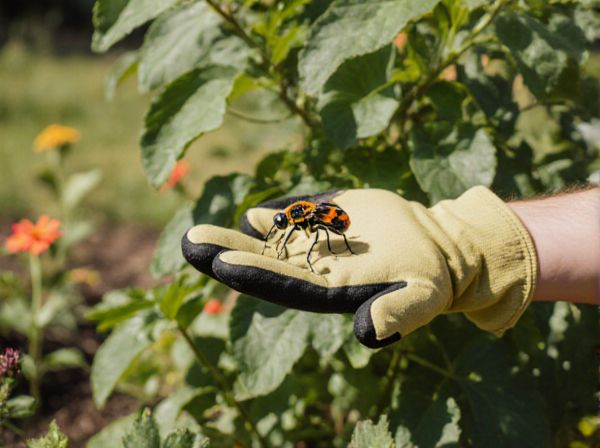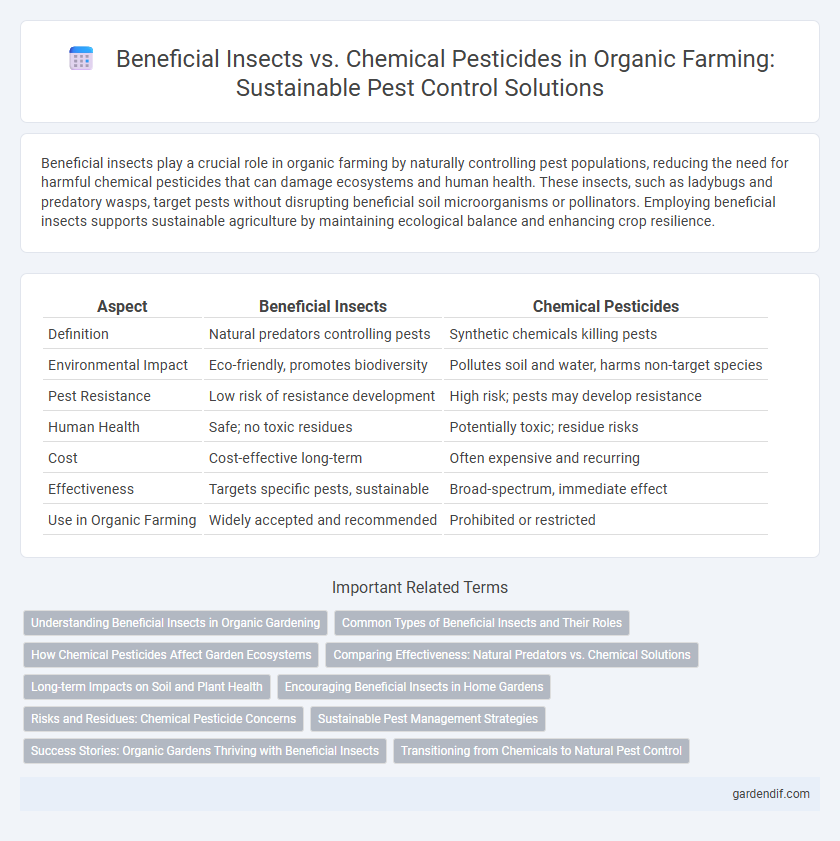
Beneficial insects vs chemical pesticides Illustration
Beneficial insects play a crucial role in organic farming by naturally controlling pest populations, reducing the need for harmful chemical pesticides that can damage ecosystems and human health. These insects, such as ladybugs and predatory wasps, target pests without disrupting beneficial soil microorganisms or pollinators. Employing beneficial insects supports sustainable agriculture by maintaining ecological balance and enhancing crop resilience.
Table of Comparison
| Aspect | Beneficial Insects | Chemical Pesticides |
|---|---|---|
| Definition | Natural predators controlling pests | Synthetic chemicals killing pests |
| Environmental Impact | Eco-friendly, promotes biodiversity | Pollutes soil and water, harms non-target species |
| Pest Resistance | Low risk of resistance development | High risk; pests may develop resistance |
| Human Health | Safe; no toxic residues | Potentially toxic; residue risks |
| Cost | Cost-effective long-term | Often expensive and recurring |
| Effectiveness | Targets specific pests, sustainable | Broad-spectrum, immediate effect |
| Use in Organic Farming | Widely accepted and recommended | Prohibited or restricted |
Understanding Beneficial Insects in Organic Gardening
Beneficial insects such as ladybugs, lacewings, and predatory beetles play a crucial role in organic gardening by naturally controlling pests without the harmful effects of chemical pesticides. These beneficial species help maintain ecological balance, reducing the need for synthetic interventions that can disrupt soil health and harm non-target organisms. Incorporating diverse plants and habitats in the garden encourages the presence of these natural predators, enhancing pest management and promoting sustainable agricultural practices.
Common Types of Beneficial Insects and Their Roles
Ladybugs combat aphids and other soft-bodied pests, playing a crucial role in natural pest control for organic gardens. Predatory wasps target caterpillars and beetle larvae, reducing crop damage without harmful chemicals. Lacewings and their larvae effectively consume aphids, mites, and scale insects, promoting plant health while maintaining ecological balance.
How Chemical Pesticides Affect Garden Ecosystems
Chemical pesticides disrupt garden ecosystems by killing not only target pests but also beneficial insects like pollinators and natural predators, leading to imbalanced pest populations and reduced biodiversity. Residual toxins accumulate in soil and water, harming earthworms, microbes, and other vital organisms that contribute to soil health and nutrient cycling. These disturbances weaken the garden's natural resilience, increasing dependence on more chemicals for pest control and threatening long-term sustainability.
Comparing Effectiveness: Natural Predators vs. Chemical Solutions
Beneficial insects such as ladybugs and predatory wasps control pest populations by targeting specific pests without harming the ecosystem, promoting long-term crop health. Chemical pesticides offer rapid pest elimination but often lead to resistance, non-selective damage to beneficial organisms, and environmental contamination. Studies reveal that natural predators sustain pest control effectively over multiple growing seasons, reducing the need for repeated chemical applications and supporting organic farming principles.
Long-term Impacts on Soil and Plant Health
Beneficial insects enhance soil fertility by promoting nutrient cycling and natural pest control, which preserves microbial diversity and reduces chemical residues. Chemical pesticides disrupt soil ecosystems, leading to diminished microbial populations and long-term soil degradation. Sustainable pest management through beneficial insects supports resilient plant health and improved crop yields over time.
Encouraging Beneficial Insects in Home Gardens
Encouraging beneficial insects such as ladybugs, lacewings, and parasitic wasps in home gardens promotes natural pest control and reduces reliance on chemical pesticides. These insects prey on common garden pests like aphids, whiteflies, and caterpillars, enhancing plant health and biodiversity. Incorporating diverse flowering plants and avoiding harmful chemicals creates a habitat that supports beneficial insect populations year-round.
Risks and Residues: Chemical Pesticide Concerns
Chemical pesticides pose significant risks due to toxic residues that contaminate soil, water, and crops, threatening human health and biodiversity. Beneficial insects naturally control pest populations without harmful residue accumulation, preserving ecosystem balance and reducing chemical dependence. Persistent pesticide exposure leads to resistance, requiring higher doses and exacerbating environmental and health hazards.
Sustainable Pest Management Strategies
Beneficial insects like ladybugs, lacewings, and parasitic wasps play a crucial role in sustainable pest management by naturally controlling harmful pest populations without damaging ecosystems. Utilizing biological control methods reduces reliance on chemical pesticides, which often lead to pesticide resistance, environmental contamination, and non-target species harm. Integrated approaches combining beneficial insects with organic practices enhance crop health, promote biodiversity, and support long-term agricultural sustainability.
Success Stories: Organic Gardens Thriving with Beneficial Insects
Organic gardens experience remarkable success using beneficial insects such as ladybugs, lacewings, and predatory wasps to naturally control pests without chemical pesticides. These insects reduce harmful pest populations while promoting biodiversity and soil health, resulting in higher crop yields and robust plant growth. Case studies show that organic farms implementing integrated pest management with beneficial insects avoid chemical residues and improve ecosystem resilience.
Transitioning from Chemicals to Natural Pest Control
Transitioning from chemical pesticides to beneficial insects enhances sustainable pest management by promoting ecological balance and reducing harmful residues. Beneficial insects like ladybugs, predatory mites, and parasitic wasps target specific pests, minimizing crop damage without impacting soil health or pollinators. Organic farms adopting this natural pest control method experience improved biodiversity, lower chemical inputs, and increased resilience against pest resistance.
Beneficial insects vs chemical pesticides Infographic

 gardendif.com
gardendif.com